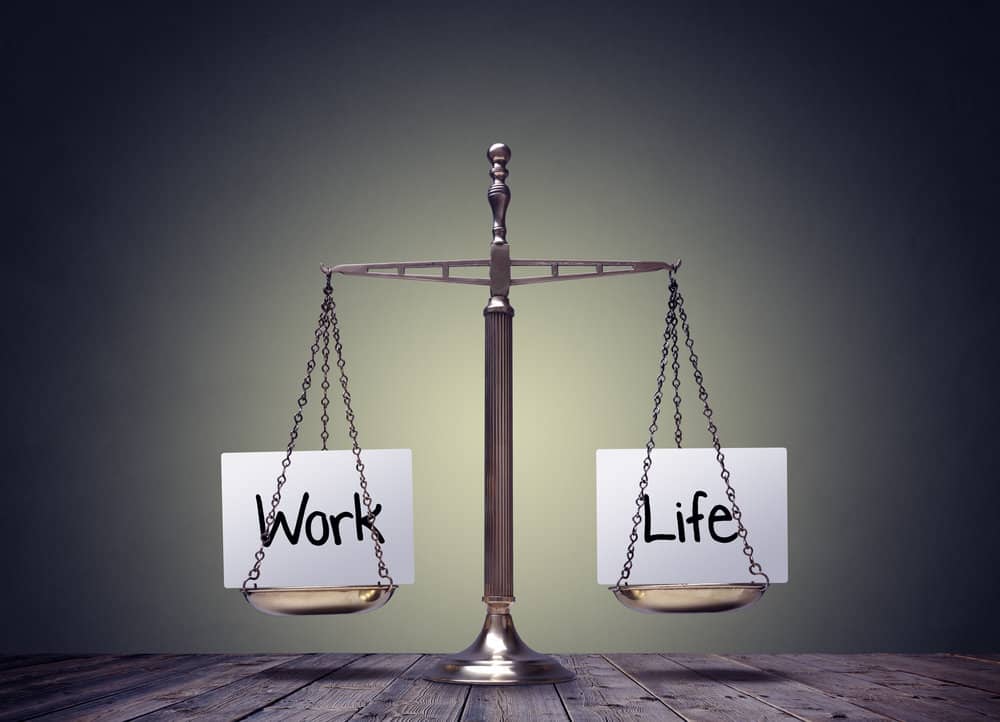Achieving a better work-life balance as a legal professional may be easier said than done because of the legal profession’s demands. Unfortunately, most lawyers often need to work outside of normal business hours to keep up with their workload, and many report that it takes a toll on their personal lives.
Furthermore, long working hours can lead to burnout, mental health, and wellness issues. Therefore, following the simple tips and strategies below is vital, helping you become more efficient and achieve a better work-life balance.
Achieving Better Work-Life Balance as a Lawyer

Implement the following tips to find the equilibrium that allows you to evenly balance the scales of your professional and personal needs as a lawyer.
1. Switch Off from Work When After Hours
According to this analysis by Bloomberg Law, the lawyers surveyed said they find it extremely difficult to disconnect from work.
The best way to avoid this problem of disconnecting from the demands of the legal profession is to keep your personal cell phone free of work apps to prevent you from seeing work-related notifications when you allocate for yourself. Also, turn off notifications and your work email accounts.
Doing this makes you less likely to feel tempted to check in or respond, allowing you to maintain clear boundaries between work and your time. Once you see that the world won’t crumble around you during those few hours of quiet, you’ll enjoy the quiet you deserve while recharging for the next working day.
2. Embrace Flexibility
If the lockdowns and remote work revealed that you work better from home or that the time saved from commuting allows you to do something more meaningful in your personal life, perhaps the time has come to embrace the hybrid work model. Most law firms have incorporated legal technology, allowing you to achieve your work goals clearly and transparently.
Organizing your workspace is essential wherever you work, helping create an effective and productive work environment. Digitized files make it easier to find documents, and legal cloud-based technology helps automate administrative tasks, giving you flexibility, peace of mind, and more time to achieve a better work-life balance.
3. Use Time Blocking for Better Productivity
When you constantly switch between meetings, appointments, and other tasks, you’ll feel drained and less productive, meaning you’ll need to work longer hours. Time blocking allows you to organize your work hours in a way that suits you best. Use the hours of the day when you work best to concentrate on tasks that require your utmost attention, like research and writing.
If possible, group meetings together towards the end of the day to prevent you from switching between other important tasks, allowing you to work smarter.
4. Create an Alternative Work Style or Take Regular Breaks
You don’t have to work during the traditional work hours if you feel it inhibits your work-life balance. For example, many lawyers have successful law practices yet work part-time. Moreover, creating an alternative work style allows you more time to incorporate the things you love into your workday, increasing productivity.
Conversely, if you work full time, make time on your schedule to incorporate several breaks throughout the day to recharge and improve your focus. However, an effective break means getting out of the office and taking a walk, yoga, going for a meal, etc.
5. Your Identity Consists of More than Your Career
Your professional life is important but not as critical as your well-being. Therefore, you must care for your physical and emotional needs to remain healthy.
Eat well, get enough sleep, and exercise are as important as doing things that make you happy, such as hobbies, spending time with your family, traveling, etc.
6. Delegate Instead of Juggling
All lawyers know how to juggle their workload, but learning when to delegate some of your work to others is essential. Take the time to see which people have the expertise to take on some of the tasks that can help you reduce your workload, helping you better organize your day.
7. Establish Boundaries
It’s easy for colleagues to fall into the habit of phoning you at night or over weekends. However, you can prevent this from becoming a problem by setting parameters and showing your colleagues that they must respect your time.
8. Know When to Say “No”
If you always have more on your plate because you find it difficult to refuse to take on cases or want to do everything yourself, then now’s the time to learn to reduce your workload. Saying “no” to others when you have endless projects does not show weakness but strengthens your position and improves your productivity.
9. Practice Daily Mindfulness
As a lawyer, you know that you have chosen a fast-paced and stressful profession. Expectations to meet work demands increase anxiety, hence the profession’s prevalence of substance abuse and mental health issues.
Studies have shown that meditation and mindfulness relieve anxiety and help you keep cool in stressful situations. Incorporate mindfulness into your daily program through a popular app, find a personal mindfulness consultant, or take up yoga.
10. Consider Your Work Options
If you work at a corporate firm, the work culture will tend toward a high-pressure environment and longer work hours. Perhaps the time has come to consider working for a smaller firm as an in-house corporate lawyer or going solo. You will have more management responsibilities but more control over managing your time.
However, if you aren’t ready to move to another firm, use your position in your current law firm to shift the culture. You can prove that productivity is not dependent on longer work hours. It may take some effort, but you can also show how improved communications and transparency can improve revenue targets and trust.
Finally, lead the way in removing the stigma of blocking out calendar times for personal situations and time off when needed.

Tips for Lawyers to Maintain Work-Life Balance
1. Identify Your Priorities and Set Boundaries
2. Create an Alternative Work Style or Take Regular Breaks
3. Remember That Your Identity Consists of More Than Just Your Career
4. Delegate Tasks Instead of Juggling Everything at Once
5. Establish Boundaries with Colleagues
6. Learn to Say ‘No’ When You Have Too Much on Your Plate
7. Practice Daily Mindfulness
8. Consider Your Work Options Carefully
9. Lead the Way in Removing Stigmas Around Taking Time Off and Personal Situations
10. Show How Improved Communications and Transparency Can Improve Revenue Targets and Trust
11. Schedule Time for Yourself – Even 15 Minutes a Day Can Make a Difference
12. Take Breaks During Long Court Days to Recharge Your Mental Energy
13. Find an Accountability Partner Who Understands the Struggles of Being a Lawyer
14. Practice Self-Care and Exercise Regularly
15. Disconnect from Technology When You’re Not Working, So You Can Enjoy Quality Time with Family and Friends
Final Take
Achieving a better work-life balance will become an ongoing process as your work and personal needs change. Remain flexible and make small changes where needed to ensure equal proportions of work and pleasure, helping you find joy in the work you love.
FAQs
What are some other tips and strategies for achieving a better work-life balance as a lawyer?
Some other tips and strategies for achieving a better work-life balance as a lawyer include scheduling time for yourself, taking regular breaks throughout long court days to recharge your mental energy, delegating tasks instead of juggling them all at once, establishing boundaries with colleagues, finding an accountability partner who understands the struggles of being a lawyer, practicing self-care and exercising regularly, and disconnecting from technology when you’re not working.
How can I reduce stress in my law career?
To reduce stress in your law career, it is important to prioritize your tasks and set boundaries. Try practicing mindfulness by incorporating meditation into your daily routine or try yoga. It is also important to delegate tasks instead of attempting to juggle everything simultaneously. Establishing boundaries with colleagues and learning to say ‘no’ when you have too much on your plate can also help reduce stress levels. Finally, practice self-care and disconnect from technology when not working to enjoy quality time with family and friends.
What are some of the signs that I may be experiencing burnout?
Burnout is often characterized by physical, emotional, and mental exhaustion caused by excessive and prolonged stress. Signs that you may be experiencing burnout include feeling overwhelmed, fatigued, difficulty concentrating or making decisions, irritability or apathy, lack of motivation or energy, feeling like you’re constantly behind in tasks, and feeling disconnected from work activities or other people. If you experience any of these symptoms, taking a step back and adjusting your work-life balance is important.
Are there any resources available to help lawyers achieve a better work-life balance?
Several resources are available to help lawyers achieve a better work-life balance. Many organizations specifically cater to lawyers with helpful tips and strategies for managing stress and achieving a healthier balance between work and home life. Additionally, online support groups can be beneficial in providing an outlet for legal professionals who may feel overwhelmed or isolated by their careers. Finally, many local law firms offer seminars, workshops, and other events to educate attorneys on the importance of maintaining a healthy work-life balance.
How can long working hours specifically lead to burnout and mental health issues?
Working long hours can lead to burnout and mental health issues by increasing stress, reducing energy, and decreasing motivation. It also makes it difficult to find time for self-care or leisure activities, which can further contribute to feelings of exhaustion. Additionally, lack of healthy boundaries with colleagues can lead to burnout as employees may feel unable to take breaks or decline extra tasks.



